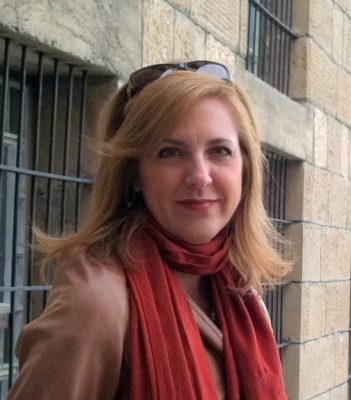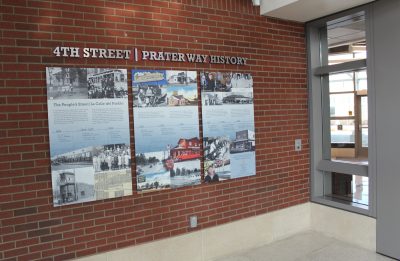Ask a consulting historian: Alicia Barber
06 February 2017 – editors

Consulting historian Alicia Barber. Photo credit: Sarah Cowie.
Alicia Barber is a writer, historian, and consultant living in Reno, Nevada. Founder of the multi-faceted historical consulting firm Stories in Place, she edits the website and app Reno Historical and serves on the NCPH Consultants Committee.
How did you first become interested in history?
I’ve always been interested in the American cultural landscape. I was an undergraduate English major, but both my M.A. and Ph.D. are in American Studies, which allowed me to explore place identity and place attachment through the lenses of literature as well as history, architecture, geography, and other disciplines. When I was first introduced to the foundational literature of public history and public memory, it was like a light had clicked on. I was fascinated by the intersections of history, memory, and place. I spent two summers during graduate school researching historic roads and buildings for the National Park Service’s Historic American Building Survey and Historic American Engineering Record (HABS/HAER). At the end of each project, I wrote a formal report for the Park Service and then put together separate presentations about those places for park staff and for members of the surrounding communities. I absolutely loved interacting with so many different groups of people, and I realized then that maybe I didn’t have to choose between academic and public work, that ideally I could both study the idea of place and also help to strengthen a sense of place in the communities I researched. After earning my Ph.D. at University of Texas at Austin, I taught for ten years, putting together courses in public history, museum studies, and oral history among other more “traditional” academic subjects. I learned a lot by creating and directing hands-on public projects for my students.
When did you start consulting?
I founded my consulting business in 2013, but I had been consulting in a mostly unpaid capacity for years before that. While working as a professor, I helped formulate exhibits for a new children’s museum, conducted historical research for a hospital’s sesquicentennial, and curated the text and images for an outdoor historical installation. I learned much more about the financial and administrative aspects of consulting—and how to better value my own work—while directing my university’s oral history program. Writing grant proposals, overseeing budgets, and managing multiple projects served as great preparation for running a business. When that program was dismantled, I began to consult full time, first as a sole proprietor and then forming an LLC.
Do you specialize in a particular field of public history?
Many of my projects involve oral history, but I also specialize in historical displays, coordinating and developing content for digital history projects, and researching all aspects of the built environment. My scholarly expertise centers on the American West, and Nevada in particular, and I’m interested in bringing that history to the public in as many formats as possible.
How and where do you conduct most of your business?
Thanks to digital tools and databases, I’m able to conduct a great deal of research, edit audio, and, of course, write, at my desk. Any off-site research I need to conduct is generally at local or regional archives. When I’m working on an oral history project or researching buildings, I spend more time out in the community. I’m constantly balancing client work with my own writing projects, speaking engagements, and service on local and state history and historic preservation-related boards and commissions.
Describe your typical clients.
Most of my work is with public agencies or institutions. My repeat clients include the University of Nevada, Reno Libraries, Nevada Humanities, and the Regional Transportation Commission of Washoe County. Lately I’ve started to conduct research and develop displays for private businesses, and I’ve conducted a few oral histories for private clients, too.
Do you collaborate with other professionals on projects?
I’m always brainstorming with librarians and archivists about how to make materials and information more accessible to the public. Over time I’ve developed excellent relationships with a photographer, a graphic designer, a transcriber, and a web developer who I hire as subcontractors as projects require. It’s critical to identify those go-to people you can count on.
How do you handle the business aspects of your consulting work, such as billing, taxes, and insurance?
At this point I handle the business end myself. There’s a learning curve, but for someone without permanent employees it isn’t too difficult. Early on, I became certified as a woman-owned enterprise, which was a lengthy process but extremely worthwhile when working with public agencies that prioritize diversity in hiring. Securing local and state business licenses, purchasing liability insurance, and acquiring a federal tax ID are all fairly straightforward once you’ve clearly determined your mission.
How do you seek new work?
I secure a lot of work from former clients or via referrals. Sometimes I’ll partner with organizations to apply for grants that write me into the budget. I get a lot of queries through my website from people who have heard me speak in the community.
Describe some of the projects you’ve recently worked on.

One of the permanent transit station displays Alicia Barber developed for the Regional Transportation Commission’s 4th Street-Prater Way History Project, which also included oral histories, architectural research, and designs for eight historically themed bus shelters. Photo credit: Alicia Barber.
We recently launched Illuminating Reno’s Divorce Industry, a website about Reno’s historic migratory divorce trade. I also completed two major community oral history projects including the 4th Street-Prater Way History Project and an oral history of Reno’s Midtown District. Those both included architectural research that I incorporated into Reno Historical. I’ve worked on historical displays for two bus stations and a historic post office-turned-retail development, and I recently researched the history of a turn-of-the-century ranch and a hotel-casino. If you value variety and independence, this may be the job for you, but it’s not the easiest path. I feel very passionate about making places more meaningful through history.
~ This post is part of our “Ask a Consulting Historian” series, brought to you by the NCPH Consultants Committee. Follow the Consultants Committee on Twitter at @NCPHconsultants. You can find more “Ask a Practitioner” posts here.



